




TV Food Diary
Use Diary to Track Food
Ads
One way to help your children become more aware of the many food ads that they see is to encourage them to track the food products that appear in the commercials the next time you’re both watching TV. Use this as an opportunity to discuss with your kids the types of food products they see in ads, as well as the tricks used to capture their attention.
Use Diary to Track TV Watching
The TV Diary can be used for another purpose as well. At the end of one week, add up the total number of hours of TV your children watched TV.
The TV Food Diary also offers an opportunity to discuss how your child is spending his/her TV watching time and how much time is being devoted to TV watching alone. This is a chance to consider whether some changes could made involving other uses of time beyond the screen.
Making Choices
What if the child were asked to choose among the programs that he/she is currently watching and decide which one(s) could most easily be given up? This will involve some thinking and weighing of options. Which of these programs are ones that you could both agree are worth continuing to watch?

One way to help your children become more aware of the many food ads that they see is to encourage them to track the food products that appear in the commercials the next time you’re both watching TV. Use this as an opportunity to discuss with your kids the types of food products they see in ads, as well as the tricks used to capture their attention.
Use Diary to Track TV Watching
The TV Diary can be used for another purpose as well. At the end of one week, add up the total number of hours of TV your children watched TV.
The TV Food Diary also offers an opportunity to discuss how your child is spending his/her TV watching time and how much time is being devoted to TV watching alone. This is a chance to consider whether some changes could made involving other uses of time beyond the screen.
Making Choices
What if the child were asked to choose among the programs that he/she is currently watching and decide which one(s) could most easily be given up? This will involve some thinking and weighing of options. Which of these programs are ones that you could both agree are worth continuing to watch?

Research on Screen Time
There is growing body of evidence telling us
that
our children are now spending way too much
time sitting in front of screens
and that this is not good for their health.
In fact, many researchers are telling us
that
television viewing and other screen time may
be an important cause of childhood
obesity.
Relationship Between Screen Time and Obesity
Let’s look at just one sample study published in 2008. Investigators at Children’s Nutrition Research Center in Houston, Texas conducted this study involving a diverse group of 1800 preschool children, ages 2-5. They compared those children who used more than 2 hours of TV and videos to those watching less than 2 hours. They also compared the children as to whether they were computer users or nonusers. The researchers wanted to look at whether screen usage by these children related to various health problems occurring with obesity.
They found that about 31% of the children spent more than the recommended two hours watching just TV. Those children who watched more than the recommended 2 hours were found to be most likely to be overweight already or at risk for being overweight!
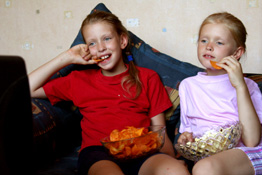
Relationship Between Screen Time and Obesity
Let’s look at just one sample study published in 2008. Investigators at Children’s Nutrition Research Center in Houston, Texas conducted this study involving a diverse group of 1800 preschool children, ages 2-5. They compared those children who used more than 2 hours of TV and videos to those watching less than 2 hours. They also compared the children as to whether they were computer users or nonusers. The researchers wanted to look at whether screen usage by these children related to various health problems occurring with obesity.
They found that about 31% of the children spent more than the recommended two hours watching just TV. Those children who watched more than the recommended 2 hours were found to be most likely to be overweight already or at risk for being overweight!

Overweight Kids
So what could possibly explain the
relationship between a child’s being
overweight and his/her screen time? Experts
tell us that children spending more time with
screens tend to:
For more about the research conducted at the Children's Nutrition Research Center in Houston, see:
http://www.ars.usda.gov/is/pr/2008/080421.htm
Also, for a sampling of some of the many studies that are a part of this growing body of research on the relationship between screen time and obesity, see:
http://archpedi.ama-assn.org/cgi/content/full/162/3/283
http://archpedi.ama-assn.org/cgi/content/full/162/9/899
http://www.pubmedcentral.nih.gov/articlerender.fcgi?artid=1906831
http://jpubhealth.oxfordjournals.org/cgi/content/full/fdn022

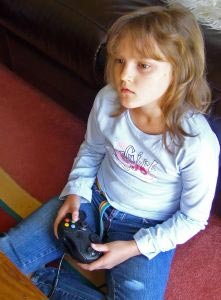
- Substitute TV/video watching for physical activity
- Watch TV ads that encourage eating unhealthy; fatty foods
- Snack while watching TV/videos
For more about the research conducted at the Children's Nutrition Research Center in Houston, see:
http://www.ars.usda.gov/is/pr/2008/080421.htm
Also, for a sampling of some of the many studies that are a part of this growing body of research on the relationship between screen time and obesity, see:
http://archpedi.ama-assn.org/cgi/content/full/162/3/283
http://archpedi.ama-assn.org/cgi/content/full/162/9/899
http://www.pubmedcentral.nih.gov/articlerender.fcgi?artid=1906831
http://jpubhealth.oxfordjournals.org/cgi/content/full/fdn022


American Academy of Pediatrics
The American Academy of Pediatrics, based on
the research now available, has published the guide Facts for Families.
(American Academy of Pediatrics 2005).
The U.S. Department of Health and Human Services (US DHHS) has established a national objective for 2010 to “increase the proportion of adolescents who view television 2 or fewer hours on a school day” (US DHHS 2000).
http://cdc.gov/nccdphp/dnpa/obesity/pdf/TV_Time_Highligts.pdf
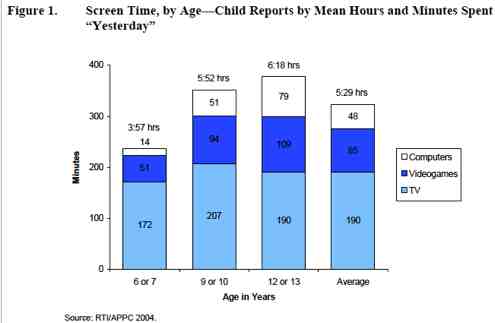
The U.S. Department of Health and Human Services (US DHHS) has established a national objective for 2010 to “increase the proportion of adolescents who view television 2 or fewer hours on a school day” (US DHHS 2000).
http://cdc.gov/nccdphp/dnpa/obesity/pdf/TV_Time_Highligts.pdf

Screen Use
While the media no doubt entertain your
child, he/she is also learning a great deal
about the world around him through the
stories told to him by media.
Media as a Child's Major Storyteller
Today, the major storyteller for our children are the media and while we may not like all the stories they tell about our world, our children are being exposed to their stories daily. In fact, many media experts tell us that the media serve as the major source in helping our children learn about the world around them. Dr. George Gerbner, a renowned media expert, warned that our children used to learn about the world around them through the stories told to them by our major institutions (e.g. families, schools, faith-based groups, etc.). Now, the major source of learning about the world is the media which they consume regularly.
Parent Supervision
Since the majority of a young child’s experience with TV and videos takes place at home, you as the parent have many chances to intervene, helping to prevent your child from experiencing some potentially unpleasant side-effects based on what he/she is watching.
Using the Screen to Discuss Difficult Issues
Depending on your child's age, the screen can provide a means for raising awareness about a wide variety of issues that may arise outside the home. In the comfort and safety of your home, you may use what is happening on the screen as a means of talking about some difficult issues you want to discuss with your child such as the ways in which friends should treat one another, how people sometimes deal with their angry or sad feelings and ways to cope, or the problems families sometimes have in talking about things that really are bothering them. A character on TV who is having a problem can sometimes give you an opening to raise some of these difficult topics with your child.
Viewing Favorite Programs Together
Your involvement with your child when viewing favorite programs can also help to highlight some of the positive aspects of a media experience that a family can share. Media offer many wonderful options for families to enjoy together; take time to share in the experience of some of these offerings with your child.
We certainly don’t want to forget the fact that screens are not going away. As exciting new technologies become more and more accessible to all of us, screens will continue to play a major role in most of our lives and the lives of our children.
What we most want to stress is that it is very important that our children become active, savvy and critical consumers of media. They will have so many choices available to them. Your help in discriminating among these many options was never more important than it is today!
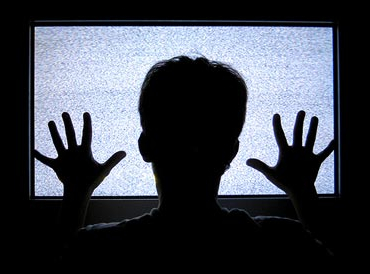

Media as a Child's Major Storyteller
Today, the major storyteller for our children are the media and while we may not like all the stories they tell about our world, our children are being exposed to their stories daily. In fact, many media experts tell us that the media serve as the major source in helping our children learn about the world around them. Dr. George Gerbner, a renowned media expert, warned that our children used to learn about the world around them through the stories told to them by our major institutions (e.g. families, schools, faith-based groups, etc.). Now, the major source of learning about the world is the media which they consume regularly.
Parent Supervision
Since the majority of a young child’s experience with TV and videos takes place at home, you as the parent have many chances to intervene, helping to prevent your child from experiencing some potentially unpleasant side-effects based on what he/she is watching.
Using the Screen to Discuss Difficult Issues
Depending on your child's age, the screen can provide a means for raising awareness about a wide variety of issues that may arise outside the home. In the comfort and safety of your home, you may use what is happening on the screen as a means of talking about some difficult issues you want to discuss with your child such as the ways in which friends should treat one another, how people sometimes deal with their angry or sad feelings and ways to cope, or the problems families sometimes have in talking about things that really are bothering them. A character on TV who is having a problem can sometimes give you an opening to raise some of these difficult topics with your child.
Viewing Favorite Programs Together
Your involvement with your child when viewing favorite programs can also help to highlight some of the positive aspects of a media experience that a family can share. Media offer many wonderful options for families to enjoy together; take time to share in the experience of some of these offerings with your child.
We certainly don’t want to forget the fact that screens are not going away. As exciting new technologies become more and more accessible to all of us, screens will continue to play a major role in most of our lives and the lives of our children.
What we most want to stress is that it is very important that our children become active, savvy and critical consumers of media. They will have so many choices available to them. Your help in discriminating among these many options was never more important than it is today!


Tips For Reducing Screen Use
- Don’t eat meals in front of the TV or computer.
- Keep the TV and other screens off during meals; meals are a great time for talking.
- Get the TV and the computer out of your child’s bedroom!
- Put all screens your child uses in areas that are in view of an adult so that it is possible to remain aware of the way in which these screens are being used even if you are engaged in other activities in your home (e.g. the kitchen, the family room, etc.)
- Decide as a family how to reduce screen time; what programs could you decide to get rid of, which ones could you not live without and why.
- Have a discussion with your children about the kinds of programs that will be encouraged at home as well as those that should not be viewed. Trying to define as a family the qualities of those programs you all agree can or should be watched can prove a very valuable and important family activity. This activity is also an important first step in helping your children make better use of the screen time that they are allowed. It is also a first important step in encouraging your child to become a more critical consumer of media.
- Make a plan for TV/video viewing for the week; decide how much time the child/the family will spend watching and then discuss how that time will be used.
- Try to find alternative activities that get your child up and moving either within the home or outside.
- Remember your children are watching how you use screens; try to provide a good model about screen use.
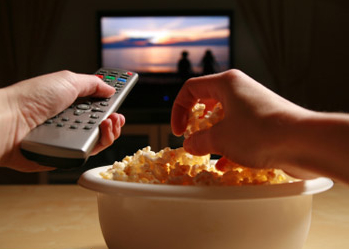
Live Outside the Box Challenge
Check out Live
Outside the Box developed by King County
Overweight Prevention Initiative, Public Health
Seattle and King County. With special
acknowledgement to Adrienne Dorf, MPH, RD, CD,
Nutrition Consultant Child Care Health Program,
Public Health, Seattle and King County. To
download a copy of the PDF for offline viewing,
click HERE. To view the document
in a live web-browser, click
HERE.




